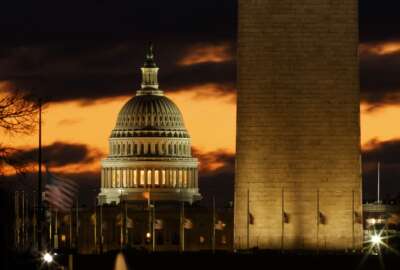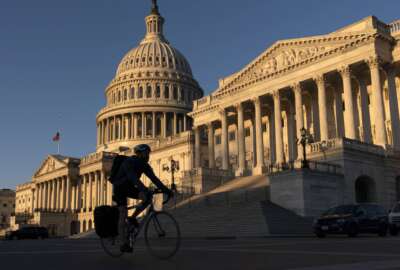
You’d be surprised with what takes up most of the Senate’s time
Congress takes longer than ever to get through the confirmation process with political appointees and judges.
Best listening experience is on Chrome, Firefox or Safari. Subscribe to Federal Drive’s daily audio interviews on Apple Podcasts or PodcastOne.
It might be the great deliberative body. But much of what the Senate deliberates on is pretty mundane, such as the nomination for undersecretary of agriculture for marketing and regulatory programs. What do senators think about all of this? The Federal Drive with Tom Temin gets some insight from WTOP Capitol Hill correspondent, Mitchell Miller.
Interview transcript:
Tom Temin: And well, what do they think of that type of work?
Mitchell Miller: Well, it’s interesting because a lot of people are actually frustrated with the process right now. For example, even though we’re more than a year and a half into the Biden administration, there are still plenty of vacancies in these key positions. There’s no deputy director of the Office of Personnel Management, President Biden recently withdrew his nominee for controller at OMB, key positions at the Social Security Administration haven’t even had their nominees named yet. And as Federal News Network has pointed out, in figures from the Partnership for Public Service, it’s taken the average Biden nominee, not including judges, 127 days to get Senate confirmation that is up from 115 days during the Trump administration. And it’s only been getting longer since the Obama administration. And if you look way back during President George W. Bush’s first year in office, 75% of his nominees had been confirmed in the first year, by comparison, it’s only about 55% for the Biden administratio., This process just keeps getting longer and longer. And then it eats into the time that senators actually have to develop legislation.
Tom Temin: Yeah, so you can’t really blame party politics necessarily, because the Senate is controlled more or less by the Democrats now. So there must be some other factor going on.
Mitchell Miller: Right? It’s a combination of a lot of different things. And you’re right, it’s not a partisan thing in this case, because it’s been getting longer under both administrations Republican and Democrat. Part of it is that it takes longer for administrations to get their nominees to the Senate. Also, there are simply more people that require now the Senate to approve them. And then, of course, just the Senate, the greatest deliberative body in the world, takes a long time itself, to get through all of this. And what you hear on Capitol Hill hear a lot from senators and they’ll they’ll mention this in floor speeches a lot, as well as in the halls is they just don’t have any time they feel to really create new policies to create legislation, part of the reason that many of them actually came to Congress in the first place. And of course, there’s obviously a huge amount of importance to what they’re doing when they confirm these administration nominees. And also a big part of their job is of course, confirming judges, which they still move through fairly quickly, although that also takes a lot of time. But it’s amazing how much floor time is actually spent on just these two things with confirming nominees and judges that people don’t really realize I don’t think.
Tom Temin: And in the meantime, that’s going to be set aside for the immediate moment because the lame duck session is about to come up. And what’s your anticipation of what’s going to happen during that period?
Mitchell Miller: Well, it’s interesting given that all that needs to be done, this could actually be one of the busiest lame duck sessions in close to a decade, you have Florida lawmakers pressing to make sure that funding for hurricane Ian relief gets to their state and the damages are still being added up. The defense bill will likely take up most of the time lawmakers have proposed hundreds of amendments as they usually do. And with that funding deadline of December 16. While it may seem far away right now, once you get through the election, before you know it, it’s going to be coming on us just as fast as it always seems to do every year. So they’re going to have to do another short term spending bill which many lawmakers don’t want or more likely, they will try to actually believe it or not pass the spending bill for the coming fiscal year that they’re supposed to be doing. That would include a lot of different things: renewal of federal flood insurance, it’s got a big water bill. There is funding, of course for Ukraine, among other things, they are hoping that they can finish all of this before Christmas. We’ll see what happens.
Tom Temin: We’re speaking with Mitchell Miller, Capitol Hill correspondent for WTOP, you can believe what one wants in the polls. Now it’s hard to know who’s going to control Congress after the election after the lame duck is over next year when they are seated. But maybe the House is poised to become Republican-controlled. What would be the ramifications across a variety of issues?
Mitchell Miller: Well, there are a lot of potential changes that would happen there. And the Republicans have signaled many of them already, as you alluded to, many GOP lawmakers feeling fairly confident right now that they are going to take the House, we’ll have to see what happens in the Senate. But if that does happen, one area that is a big area where Republicans could make changes is with energy. You constantly have heard not only during the campaign, but all through this year, Republicans holding news conference and complaining basically about the Biden administration’s energy policies which Republicans feel has gone too far in the direction of green energy initiatives. So one of the things that we’re going to likely see is that within the Energy and Commerce Committee, the House Republicans on that committee, they want to shift the direction of energy policy and if possible, somehow pull back on some of these administration policies that they’re starting to move forward with. The New York Times recently outlined how lobbyists from the natural gas industry are already having discussions with Republican lawmakers, seeing how they can change things. Many Republicans, of course, disagree with this move away from natural gas, for example, giving low and moderate income households rebates, where 1000s of dollars to put in things like electric powered water heaters electric stoves, anything basically electric and the natural gas industry obviously concerned about that. Also, there’s the matter of the funding for Ukraine. House Minority Leader Kevin McCarthy says there should not be a blank check for assistance there. So a lot of concern there among Republicans as well as Democrats on the Senate side about what will happen there. I still think that Ukraine aid will likely get through in the lame duck session. But there’s a lot of other things that that they could be tacking on to the overall legislation as well. But I think we’ll see, of course, committee changes potentially, if that happens with the Republicans taking over plenty of changes could be taking place in the House, if in fact, the Republicans do win on November 8.
Tom Temin: Right. So on energy, it might crash the investments people have made in hamster treadmills, right. But if the House does become Republican, there’s still the issue of whether the majority and in the Senate would be veto-proof. And that would seem to maybe mitigate more towards stalemate than reversal of what we’ve seen.
Mitchell Miller: Exactly. And I think that’s what we’re likely going to see now we’ll see what happens with the Senate. And by the way, the Senate may not actually be settled on November 8, in fact, it probably won’t be. There’s a very good chance that there will be a Senate run-off race in Georgia, and that would push that back to December. So you would basically get that situation that we had two years ago, where we don’t really know who controls the Senate for quite a while. But if it does end up in this stalemate situation, as you point out, I think what the Republicans will likely try to do in the House is make political points on a variety of things. And as they do that, that can kind of grind the gears and slow things down. They want to basically hold back on a lot of the spending that the Democrats have already pushed through. And they want to make sure that more of that doesn’t happen. But again, it’s potentially veto-proof. So we’ll see what happens.
Tom Temin: And security has come up again in the Capitol and I know you and I have talked about this ever since the January 6 2021 events, so much repercussion that did physically button up the Capitol. And now there was a guy there the other day, who had guns in the back of his van.
Mitchell Miller: Right. This has been happening more and more frequently, you get people from various parts of the country who decide for whatever reason, they’re going to come to Washington, DC and send some kind of message. This is one of several incidences that occurred on the perimeter of the Capitol grounds, a van with several firearms inside. Fortunately, they actually had a canine unit come out and sniff it out. And then they made arrests, but this comes after a man set his car on fire and then shot himself a short distance from where this incident happened last week. Last year, there was a man in a truck who claimed to have explosives he actually parked it on the sidewalk in front of the Library of Congress. Fortunately, that ended without incident. And then you have even more serious incidents where a year ago, more than a year ago, there was a deadly attack at one of the actual areas where cars can come into the Capitol at a checkpoint the person rammed into a police officer Capitol police officer and he was killed. So this is an ongoing situation. And the new Capitol Police Chief Tom Manger has quietly ramped up a lot of the security training, changed some things. I’ve noticed that when lawmakers for example, hold a news conference here on the House side on the outside of the Capitol, there’s now closer monitoring by Capitol police officers and they’ll often put up those bike rack-type fences so that people cannot get into the perimeter. By the way, threats against lawmakers as we’ve talked about in the past five years, they’ve really soared actually 10 times the level that they used to be. They had more than 9500 threats recorded against lawmakers last year and there’s no doubt there’s been more that we haven’t heard about while lawmakers out are out campaigning. They have actually also added capitol police officers in some of the congressional districts to try to address the situation.
Tom Temin: Well hopefully things will settle down but I don’t know that’s a pretty tough wicket to get around. It really is. Mitchell Miller is Capitol Hill correspondent for WTOP.
Copyright © 2024 Federal News Network. All rights reserved. This website is not intended for users located within the European Economic Area.
Tom Temin is host of the Federal Drive and has been providing insight on federal technology and management issues for more than 30 years.
Follow @tteminWFED





